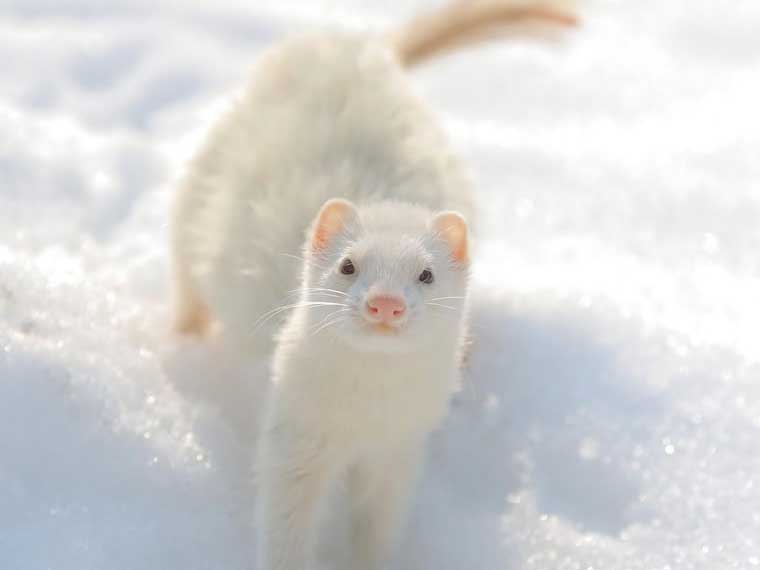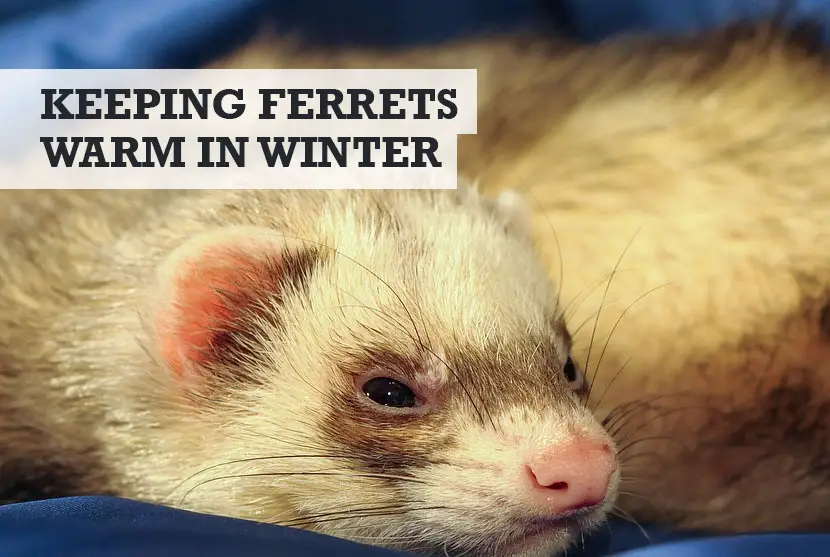Ferrets are the domesticated cousins of the weasel, stoat, ermine and polecat. This means they thrive in the cold and have a low tolerance for heat.
However, they also lack the coping skills of their wilder counterparts so you need to compensate for these in extreme temperatures – meaning you might need to take steps to keep your ferret warmer in the winter.
How to keep a ferret warm in winter? You can keep a ferret warn in winter by keeping them out of the wind and wet weather, and don’t let body temperature fluctuate wildly. Their optimum ambient temperature range is between 55 and 70 degrees Fahrenheit.
That’s a very short answer, but there’s more to it and other ways how to keep ferrets warm in winter. You can also find out below what temperature is too cold for ferrets.
What temperature is too cold for ferrets?
Ferrets are most comfortable at temperatures ranging from 60 to 70 degrees Fahrenheit (15 to 21 degrees Celsius). Ferrets do not get cold easy, however, any temperature colder than 32 degrees Fahrenheit (0 degrees Celsius) can get too cold for ferrets.
So, based on that you should be able to know when your ferret is too cold if you are monitoring temperatures. If the ferrets are too cold and need warming up in winter, here’s how you do it.
Can ferrets be kept outside in the winter?
Based on what we know, ferrets can be kept outside in the winter, but it depends on the temperature and climate. Providing the temperature does not drop below a comfortable range, and they have shelter and warmth, perhaps even a heat lamp, they should be ok.
Handy Hint: I recently published a guide to outdoor ferret enclosures which contains tips on how to make the outdoor space perfect for your pet.

How to keep ferrets warm in winter
In freezing temperatures, you will need to ensure that they have all that they need, such as fresh water, extra food and a warm place to sleep.
Ferrets are usually kept in pairs or small groups. They will cuddle up and help each other to keep warm. You could even let them nap with you.
Ferrets are designed to cope better in the cold, than they are in the heat. They have few sweat glands to release body heat, and fur that will adjust to the seasons if they have an opportunity to acclimatise.
Allow your ferrets to experience the changing seasons. Do not keep the temperature in their environment constant year round.
Ferrets are sensitive to light levels and are most active during the twilight hours of dawn and dusk. The nights will get longer and colder during winter and they will adapt naturally to seasonal timetables.
Monitor your ferrets for colds and sneezing which will be more prevalent in winter. If you or any other humans in the household have any flu-like symptoms, steer clear of them until you are well again.
Handy Hint: Depending on your climate, a winter could have days that are actually too hot. Here’s how you can cool a ferret down when the temperature rises.
Increase their physical activity to help warm up their bodies. This, and just trying to regulate their core body temperature, will require more energy. Increase their food rations to prevent weight loss.

Ferrets do have a natural tendency to put on weight before winter so monitor this before deciding on any extra rations. Prevent their becoming obese and developing other health problems as a result.
Similarly, if your ferret appears too skinny before winter, he will not be able to keep warm as much as he needs.
Give your ferrets a few extra blankets or fluffy towels, and replace lighter fabrics with fleece. Ferrets will cuddle with each other to keep warm. Make sure that they have enough room to do so.
Do ferrets need a heat lamp?
Indoor ferrets do not need heat lamps. However, if you want to keep an outdoor ferret warm in winter, and heat lamp is essential. You can see a recommendation below which you can purchase on Amazon.
Keeping ferrets warm outdoors
If your ferret is young, old or does not look well, rather allow it to live indoors so that you can monitor its condition. Only healthy ferrets should be housed outdoors.
1. Draught proof their enclosure
If your ferrets live outdoors, you want to keep the worst of the winter out by blocking the wind and preventing draughts, while at the same time allowing a sufficient flow of fresh air. If it is not possible to weather proof their entire enclosure, focus your efforts on their cage or sleeping quarters.
Prevent cold air from penetrating from below by keeping their cage off the ground and insulating it with rubber mats at all levels.
You can also provide insulated, rubberised cubby holes (view on Amazon) for them to sleep in. These may be better than hammocks in the winter which will have cold air circulating around them.
2. Damp proof their enclosure
Before winter snow falls or the rainy season begin, check the integrity of the roof of the enclosure. The roof should be sloped if your area has heavy snowfalls. Guttering should take rain and thawing snow away from the enclosure.
Prevent rain from pooling up in your ferrets’ enclosure by building in effective drainage. Ensure that the sleeping quarters remain dry, and damp proof. Lifting the cage off the ground will prevent ground water from seeping into the cage.
Ventilation is important to prevent any humidity in the air from condensing and contributing to damp build up. Mold thrives under these conditions and can cause your ferrets respiratory and other health problems.
Ferrets enjoy running around in snow. Keep an eye on them to make certain that their fur keeps the moisture away from their skin. If in doubt, towel them off before they go to sleep.
3. Hygiene factors
Water is vital to their survival so it is essential to keep it from freezing. Use larger containers made from a substance that keeps out the cold, such as rubber or plastic.
You could also insulate the containers by wrapping them in rubber or cloth, or placing one within the other.
Do not use any material, e.g. bubble wrap, that the ferrets can break off and eat. They are prone to developing obstructions in the bowel from ingesting foreign objects. This invariably means a visit to the vet, and possibly surgery.
Fill the containers with luke warm water and consider heating them, especially overnight. Float an object, that does not freeze, in the container to break the surface tension. This could be a plastic bottle, full of salty water.
Ferrets still need the loo during winter. Their litter boxes need to be kept clean else they will start using an alternative place in the enclosure. This will increase your housekeeping load which is never fun in the dead of winter.
Regularly check the state of their bedding. If they are playing outside in snow or mud, they will drag detritus into bed with them. Do not change out all the bedding. Leave traces of their own smell so that they feel secure.
4. Extreme weather
If the weather threatens to be particularly hazardous, move them out of harm’s way. Create an alternative space indoors for their cage, such as in the garage or in an enclosed porch.
You may routinely allow them outside during their play time, and inside to sleep.
How to keep a ferret warm indoors
And now to those ferrets that you need to keep warm indoors… here are my tips on how to keep an indoor ferret warm in winter.
1. Central heating
We humans tend to increase the central heating when the temperature drops outside. Take your ferrets’ needs into consideration, as well, and make sure that they do not feel uncomfortably hot or even worse, overheat. We can always put on another sweater.
Their bodies are small and they do not regulate their core temperatures as well as larger animals do. So do not subject them to large fluctuations in temperature. If you allow them outside for exercise, help them to adjust by letting them into a cool part of the house for a while, before exposing them to the full force of the central heating.
2. Damp- and draught-proof their quarters
To cater for their temperature requirements during warmer months, ferrets are usually kept in the coolest room in the house.
This area will probably get much cooler during the winter months. Prevent draughts from cooling it further by sealing all windows and placing draught excluders outside the door.
Once again, prevent the damp from building up in a confined space by properly ventilating their domain.
3. Keeping them warm while they sleep
Give your ferrets extra blankets or fluffy towels to snuggle up in in winter. Beware of leaving towels or warm clothing on the floor. You may step on a ferret making itself cozy inside.
You can bond with your ferrets by sharing your body heat with them. They will enjoy a cuddle on your lap. Keep them under a blanket or thick cover as they need dark to sleep.
It is not advisable to sleep with your ferret overnight. You may inadvertently roll onto them when you are in a deep sleep and injure them. If you’re having a light nap, you may be able to risk a cuddle.
4. More activity
It takes more effort, for both and you and your ferret, to exercise in winter. It does wonders to get your blood flowing and warms you up. Spend more time in winter, in active play with your ferrets, as opposed to games that are designed to stimulate their minds, that you may play on warmer summer days.
Conclusion
Ferrets are resilient creatures who can cope with cold weather, but even they have a point where it gets too cold for. When that happens, be prepared as possible to keep them warm in winter.
You might also like…
- How owners can bond with their ferret
- How much it costs to keep a ferret annually
- Why ferrets will often bond to only one person
Image of a ferret keeping warm in winter used in header via https://pixabay.com/photos/ferret-putoisé-mustélidé-drowsy-3723085/



